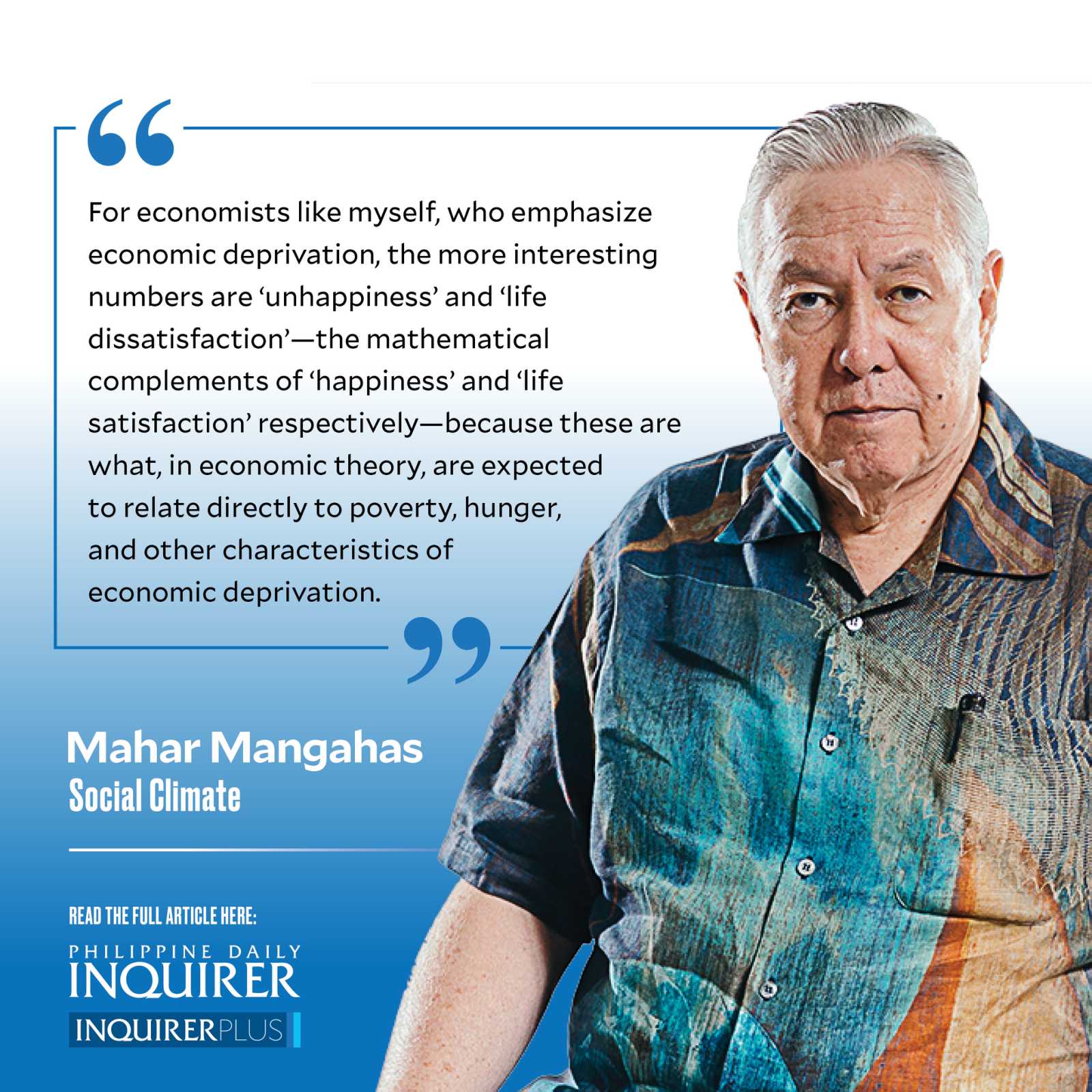Unhappiness matters more
This is written on Thursday (8/5/21), while prepping for Friday’s webinar, “#Pilipilunas: Kumustahin ang Bayan”—in English: “Phil-solution: How is the Country”—of UP Diliman’s Center for Integrative and Development Studies, which of course expected something from the SWS surveys. I sent in my slides early, but expanded the title later, into “SWS Surveys on Happiness and Life Satisfaction (or, Why Unhappiness Matters More),” in order to emphasize my message.
The invitation, coming from UP Diliman chancellor Fidel Nemenzo, suggested that they would want to know what Filipinos seek in terms of happiness. However, what Social Weather Stations looks for are not the most popular ingredients of happiness, but its movements, demographics, and relation to other indicators of well-being.
Article continues after this advertisementObviously, happiness is capable of being surveyed. Philippine surveys have been regularly done and published for some time already. SWS did 38 national surveys in 1991-2019, on whether Filipinos feel Very Happy, Fairly Happy, Not Very Happy, or Not At All Happy—this is a 4-point scale for an emotion, called affect. SWS also did 39 national surveys in 2002-2019, on whether Filipinos feel Very/Fairly/Not Very/Not At All Satisfied with their lives—this is a 4-point scale for self-recognition; it is cognitive. These two items are very common in international survey research. They have not been on the SWS agenda since the pandemic, but that is temporary.
The surveys show that Filipino “happiness” (the upper 2 points on the scale) and “life satisfaction” (likewise, its upper 2 points) are not rigid; they have moved upward and downward, back and forth. In general, they improved somewhat after 2010. The data await construction by social scientists of time-series models for forecasting the future.
For economists like myself, who emphasize economic deprivation, the more interesting numbers are “unhappiness” and “life dissatisfaction”—the mathematical complements of “happiness” and “life satisfaction” respectively—because these are what, in economic theory, are expected to relate directly to poverty, hunger, and other characteristics of economic deprivation.
Article continues after this advertisementAs an empirical fact, the direct relation exists. One can examine the relation because every SWS survey includes poverty and hunger as standard items. There is clear evidence that reduced poverty and hunger is accompanied by reduced unhappiness and life dissatisfaction.
Of course, this is a two-way street. Poverty and hunger are not rigid; they can rise even over short periods. Their worsening leads to greater unhappiness, and therefore they should be watched constantly—preferably every three months as SWS does—and not just every three years as per the official statistical schedule.
In December 2019, when last surveyed, the “unhappy” were 9 percent, and the “dissatisfied with life” were 11 percent, of all adults. These were relatively low, but are inapplicable in the pandemic. In the June 2021 SWS national survey, the Self-Rated Poor are already at 48 percent, and the Hungry are at 13.6 percent, of all families; what will the new lockdown, with minimal ayuda, do to them now?
Focusing on the avoidance of suffering, rather than the promotion of happiness, is what philosopher John Rawls’ “A Theory of Justice” implies. This theory discusses what kind of social contract would be freely agreed upon by a group of unborn souls, if prevented by a “veil of ignorance” from knowing what will be their sex, race, religion, ethnicity, citizenship, social/economic/political status, health, education, and any other potentially advantageous or disadvantageous personal attribute when they are born.
Rational prudence, Rawls argues, will lead to a voluntary social contract that guarantees minimum human rights, banning slavery and all forms of coercion and discrimination. The well-being of the worst-off person will serve to indicate the well-being of the entire society; improving the well-being of any individual will only count if thereby the well-being of the worst-off person is also improved.
Rawlsian ethics does not attach to any religion, to my knowledge; incidentally, it seems quite compatible with Christianity. Its compatibility with general Filipino ethics can be the subject of future research.
——————
Contact: mahar.mangahas@sws.org.ph

















